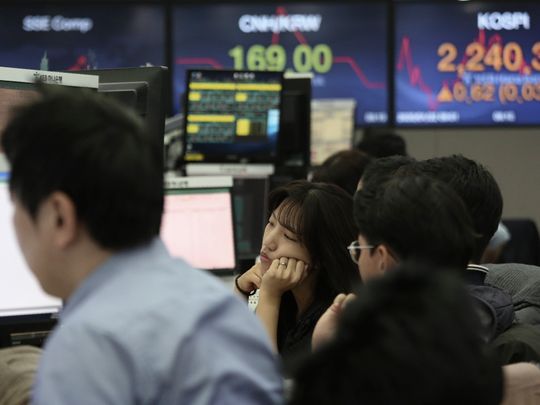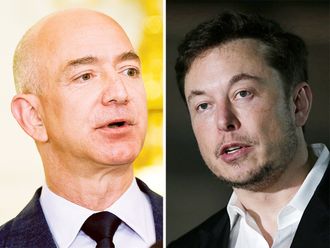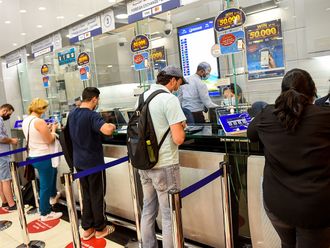
Dubai: Chinese stocks dominated the global limelight with sharp declines on Thursday as a fast-spreading deadly virus forced a lockdown of the central Chinese city where the bug originated.
China’s Shanghai Composite fell nearly 3 per cent on Thursday – recording its worst single-day percentage drop since May when US President Donald Trump threatened new tariffs on China – prompting stocks worldwide to drop.
Hong Kong’s Hang Seng Index declined 2 per cent, with the benchmark amassing more than 4 per cent in declines so far this week. Japan’s Nikkei 225 and South Korea’s Kospi shed 1 per cent. The pan-European Stoxx 600 and UK’s FTSE both were down 0.4 per cent, while the US S&P 500, Nasdaq and Dow were down between 0.4 to 0.6 per cent.
The coronavirus contagion is getting worse, with the death toll rising to 17 overnight, from an earlier reported nine cases, with more than 500 people infected, mostly in mainland China. Since Thursday morning Beijing time, all public transportation was suspended in the Chinese city of Wuhan, where the outbreak is believed to have started.
With the outbreak coinciding with the Chinese New Year celebrations that will shut the Chinese stock markets for a week starting Friday, analysts said investors have turned increasingly cautious and are rushing to sell to protect themselves from what could be a much worse situation a week after.
China heads into holidays blind
Without being able to trade for a week, investors are heading into the holiday blind. After an extended break last May, the Shanghai Composite fell 5.6 per cent as investors reacted to escalating trade tensions with the US. The sell-off wiped out almost half a trillion dollars from Chinese equity values.
However, analysts were optimistic of an imminent market rebound, citing the country was far more prepared to handle the crisis than when it was caught unaware with a similar problem in 2003.
The new flu-like virus is reminiscent of the SARS outbreak in 2003. SARS is caused by the same coronavirus family of viruses – the same group that causes the common cold. The 2003 outbreak dented China’s quarterly GDP growth, noted Larry Hu, an economist at Macquarie Capital, but he also added that the economy rebounded as the virus faded away.
“We have come a long way from SARS in 2003,” said Jeffrey Halley, a senior market analyst for Asia Pacific at Oanda, adding that the slump in Asian markets “looks more precautionary than panic-driven.”
History suggest quick rebound
Oliver Jones, a Senior Markets Economist at Capital Economics, said that history suggests virus fears will prove short-lived. “Even when the market reaction has been large, it has been short-lived.”
“China plays a much greater role in the global economy now than in 2003, with its share of global GDP more than doubling, meaning there is greater scope for events there to set the tone in global markets.” But the fairly fleeting market fallout from even the most severe of past instances means that we are not minded to change our forecasts for the year as a whole, Jones added.
Concerns over the China coronavirus also spread to European markets on Thursday, where investors were already trading on worries that the EU is the next target on President Donald Trump’s trade list.
President Trump jolted European markets when he said the EU has “no choice” but to negotiate a new trade deal with the U.S. and if not, he would need to “take action” in the form of “very high tariffs on their cars and other things.”











